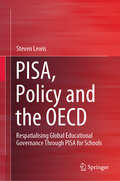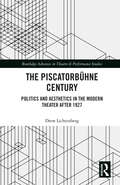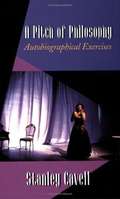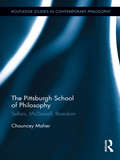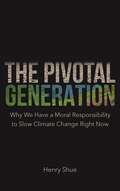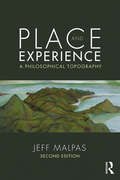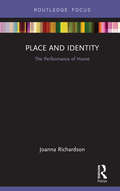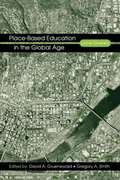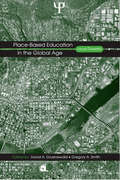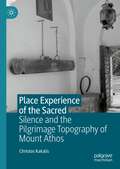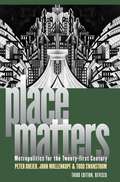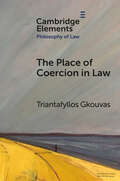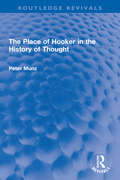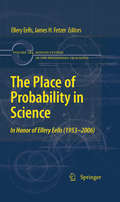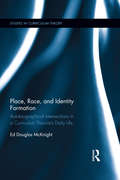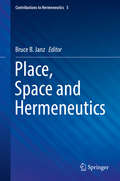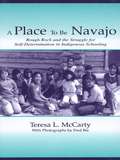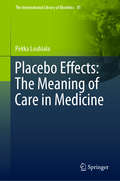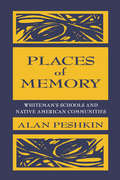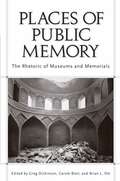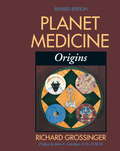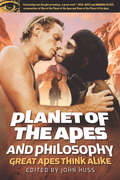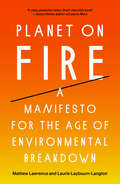- Table View
- List View
PISA, Policy and the OECD: Respatialising Global Educational Governance Through PISA for Schools
by Steven LewisThis book explores new modes, spaces and relations of the Organisation for Economic Cooperation and Development (OECD)'s global educational governance associated with the PISA for Schools test. Adopting a theoretically-rich policy sociology approach, with an emphasis on topological understandings of spatiality and power, the book examines the entire PISA for Schools policy cycle, from its initial development, to its administration and promotion in the U.S., and its local enactment by schools and teachers. It demonstrates how PISA for Schools helps to steer how schooling is locally understood and practised through separate and yet overlapping techniques: governing by (1) heterarchy, (2) respatialisation and (3) 'best practice'.The book reveals the specific effects of PISA for Schools as an exemplar of how global educational governance is increasingly enfolded within contemporary schooling, as well as discussing how we might practise a policy sociology in which the local is acknowledged as a relevant space of concern.
The Piscatorbühne Century: Politics and Aesthetics in the Modern Theater After 1927 (Routledge Advances in Theatre & Performance Studies)
by Drew LichtenbergThis study of the Piscatorbühne season of 1927–1928 uncovers a vital, previously neglected current of radical experiment in modern theater, a ghost in the machine of contemporary performance practices. A handful of theater seasons changed the course of 20th- and 21st-century theatre. But only the Piscatorbühne of 1927–1928 went bankrupt in less than a year. This exploration tells the story of that collapse, how it predicted the wider collapse of the late Weimar Republic, and how it relates to our own era of political polarization and economic instability. As a wider examination of Piscator’s contributions to dramaturgical and aesthetic form, The Piscatorbühne Century makes a powerful and timely case for the renewed significance of the broader epic theater tradition. Drawing on a rich archive of interwar materials, Drew Lichtenberg reconstructs this germinal nexus of theory and praxis for the modern theatre. This book will be of great interest to students and scholars in theatre, performance, art, and literature.
A Pitch of Philosophy: Autobiographical Exercises
by Stanley CavellThis book is an invitation to the life of philosophy in the United States, as Emerson once lived it and as Stanley Cavell now lives it--in all its topographical ambiguity.
The Pittsburgh School of Philosophy: Sellars, McDowell, Brandom (Routledge Studies in Contemporary Philosophy)
by Chauncey MaherIn this volume, Maher contextualizes the work of a group of contemporary analytic philosophers—The Pittsburgh School—whose work is characterized by an interest in the history of philosophy and a commitment to normative functionalism, or the insight that to identify something as a manifestation of conceptual capacities is to place it in a space of norms. Wilfrid Sellars claimed that humans are distinctive because they occupy a norm-governed "space of reasons." Along with Sellars, Robert Brandom and John McDowell have tried to work out the implications of that idea for understanding knowledge, thought, norms, language, and intentional action. The aim of this book is to introduce their shared views on those topics, while also charting a few key disputes between them.
The Pivotal Generation: Why We Have a Moral Responsibility to Slow Climate Change Right Now
by Henry ShueAn eminent philosopher explains why we owe it to future generations to take immediate action on global warmingClimate change is the supreme challenge of our time. Yet despite growing international recognition of the unfolding catastrophe, global carbon emissions continue to rise, hitting an all-time high in 2019. Unless humanity rapidly transitions to renewable energy, it may be too late to stop irreversible ecological damage. In The Pivotal Generation, renowned political philosopher Henry Shue makes an impassioned case for taking immediate, radical action to combat global warming.Shue grounds his argument in a rigorous philosophical analysis of climate change’s moral implications. Unlike previous generations, which didn’t fully understand the danger of burning carbon, we have the knowledge to comprehend and control rising carbon dioxide levels. And unlike future generations, we still have time to mitigate the worst effects of global warming. This generation has the power, and thus the responsibility, to save the planet. Shirking that responsibility only leaves the next generation with an even heavier burden—one they may find impossible to bear.Written in direct, accessible language, The Pivotal Generation approaches the latest scientific research with a singular moral clarity. It’s an urgently needed call to action for anyone concerned about the planet’s future.
Place- and Community-based Education in Schools
by Gregory A. Smith David SobelPlace- and community-based education – an approach to teaching and learning that starts with the local – addresses two critical gaps in the experience of many children now growing up in the United States: contact with the natural world and contact with community. It offers a way to extend young people’s attention beyond the classroom to the world as it actually is, and to engage them in the process of devising solutions to the social and environmental problems they will confront as adults. This approach can increase students’ engagement with learning and enhance their academic achievement. Envisioned as a primer and guide for educators and members of the public interested in incorporating the local into schools in their own communities, this book explains the purpose and nature of place- and community-based education and provides multiple examples of its practice. The detailed descriptions of learning experiences set both within and beyond the classroom will help readers begin the process of advocating for or incorporating local content and experiences into their schools.
Place and Experience: A Philosophical Topography
by Jeff MalpasThe first edition of Place and Experience established Jeff Malpas as one of the leading philosophers and thinkers of place and space and provided a creative and refreshing alternative to prevailing post-structuralist and postmodern theories of place. It is a foundational and ground-breaking book in its attempt to lay out a sustained and rigorous account of place and its significance. The main argument of Place and Experience has three strands: first, that human being is inextricably bound to place; second, that place encompasses subjectivity and objectivity, being reducible to neither but foundational to both; and third that place, which is distinct from, but also related to space and time, is methodologically and ontologically fundamental. The development of this argument involves considerations concerning the nature of place and its relation to space and time; the character of that mode of philosophical investigation that is oriented to place and that is referred to as ‘philosophical topography’; the nature of subjectivity and objectivity as inter-related concepts that also connect with intersubjectivity; and the way place is tied to memory, identity, and the self. Malpas draws on a rich array of writers and philosophers, including Wordsworth, Kant, Proust, Heidegger and Donald Davidson. This second edition is revised throughout, including a new chapter on place and technological modernity, especially the seeming loss of place in the contemporary world, and a new Foreword by Edward Casey. It also includes a new set of additional features, such as illustrations, annotated further reading, and a glossary, which make this second edition more useful to teachers and students alike.
Place and Identity: The Performance of Home (Routledge Focus on Housing and Philosophy)
by Joanna RichardsonThe UK is experiencing a housing crisis unlike any other. Homelessness is on the increase and more people are at the mercy of landlords due to unaffordable housing. Place and Identity: Home as Performance highlights that the meaning of home is not just found within the bricks and mortar; it is constructed from the network of place, space and identity and the negotiation of conflict between those – it is not a fixed space but a link with land, ancestry and culture. This book fuses philosophy and the study of home based on many years of extensive research. Richardson looks at how the notion of home, or perhaps the lack of it, can affect identity and in turn the British housing market. This book argues that the concept of ‘home’ and physical housing are intrinsically linked and that until government and wider society understand the importance of home in relation to housing, the crisis is only likely to get worse. This book will be essential reading for postgraduate students whose interest is in housing and social policy, as well as appealing to those working in the areas of implementing and changing policy within government and professional spaces.
Place-Based Education in the Global Age: Local Diversity
by David A. Gruenewald Gregory A. SmithThe book is a collection of success stories from around the United States and explores some of the reasons for pursuing place-based education.It shows how educators from diverse places are using place as a focal point for developing community leaders, understanding the tensions between Israel and Palestine, and for showing future teachers the power of place-based learning.
Place-Based Education in the Global Age: Local Diversity
by David A. Gruenewald Gregory A. Smith"Polished, clear, insightful, and meaningful.... This volume amounts to nothing less than a complete rethinking of what progressive education can be at its best and how education can be reconceptualized as one of the central practices of a genuinely democratic and sustainable society.... It is the kind of book that has the potential to be transformative." Stephen Preskill, University of New Mexico "The editors and contributors are pioneers in the field of educational theory, policy, and philosophy.... They are opening new areas of inquiry and educational reform in ways that promise to make this book in very short time into a classic.... The practical applications and experiments included reveal the richness of grassroots initiatives already underway to bring educational theory and policy down to earth. While spanning the richest and deepest intellectual ideas and concepts, the stories told are the types that practitioners and teachers will be able to relate to in their daily undertakings." Madhu Suri Prakash, The Pennsylvania State University This volume – a landmark contribution to the burgeoning theory and practice of place-based education – enriches the field in three ways: First, it frames place-based pedagogy not just as an alternative teaching methodology or novel approach to environmental education but as part of a broader social movement known as the "Anew localism", which aims toward reclaiming the significance of the local in the global age. Second, it links the development of ecological awareness and stewardship to concerns about equity and cultural diversity. Third, it presents examples of place-based education in action. The relationship between the new localism and place-based education is clarified and the process of making connections between learners and their wider communities is demonstrated. The book is organized around three themes: Reclaiming Broader Meanings of Education; Models for Place-Based Learning; and Global Visions of the Local in Higher Education This is a powerfully relevant volume for researchers, teacher educators, and students across the fields of curriculum theory, educational foundations, critical pedagogy, multicultural education, and environmental education.
Place Experience of the Sacred: Silence and the Pilgrimage Topography of Mount Athos
by Christos KakalisThis book explores the topography of Mount Athos, emphasizing the significance of silence and communal ritual in its understanding. Mount Athos, a mountainous peninsula in northern Greece, is a valuable case study of sacred topography, as it is one of the world’s largest monastic communities and an important pilgrimage destination. Its phenomenological examination highlights the importance of embodiment in the experience of religious places. Combining interdisciplinary insights from architectural theory, philosophy, theology and anthropology with archival and ethnographic materials, the book brings a fresh contribution to both Athonite studies and scholarship on sacred space. By focusing on the interrelation between silence and communal ritual, it offers an alternative to the traditional art historical, objectifying approaches. It reintroduces the phenomenological understanding of place, investigating also how this is expressed through a number of narratives, such as travel literature, maps and diaries.
Place Matters: Metropolitics For The Twenty-first Century
by Peter Dreier John Mollenkopf Todd SwanstromHow can the United States create the political will to address our major urban problems--poverty, unemployment, crime, traffic congestion, toxic pollution, education, energy consumption, and housing, among others? That's the basic question addressed by the new edition of this award-winning book. Thoroughly revised and updated for its third edition, Place Matters examines the major trends and problems shaping our cities and suburbs, explores a range of policy solutions to address them, and looks closely at the potential political coalitions needed to put the country's "urban crisis" back on the public agenda. The problem of rising inequality is at the center of Place Matters. During the past several decades, the standard of living for the American middle class has stagnated, the number of poor people has reached its highest level since the 1960s, and the super-rich have dramatically increased their share of the nation's wealth and income. At the same time, Americans have grown further apart in terms of where they live, work, and play. This trend--economic segregation--no longer simply reflects the racial segregation between white suburbs and minority cities. In cities and suburbs alike, poor, middle class, and wealthy Americans now live in separate geographic spaces. The authors have updated the case studies and examples used to illustrate the book's key themes, incorporated the latest Census data, and drawn on exit polls and other data to examine the voting patterns and outcomes of the 2012 elections. They have expanded their discussion of how American cities are influenced by and influence global economic and social forces and how American cities compare with their counterparts in other parts of the world. And they draw upon the latest research and case studies not only to examine the negative impacts of income inequality and economic segregation, but also assess the efforts that civic and community groups, unions, business, and government are making to tackle them. Fully up to date and far richer and more provocative, this new version surpasses its previous editions and will continue to be an essential volume for all who study urban politics and care about our cities.
The Place of Coercion in Law (Elements in Philosophy of Law)
by Triantafyllos GkouvasThe question of whether coercion is a necessary or contingent feature of governance by law is a historically complex aspect of a venerable 'modalist' trend in jurisprudential thinking. The nature of the relation between law and coercion has been elaborated by means of a variety of modally qualified accounts, all converging in a more or less committing response to whether the language, concept or essence of law as a system of governance necessarily entails the coercive character of this system. This Element remodels in non-modal terms the way in which legal philosophers can meaningfully disagree about the coercive character of governance by law. On this alternative model, there can be no meaningful disagreement about whether law is coercive without prior agreement on the contours of a theory of how law is made.
The Place of Hooker in the History of Thought (Routledge Revivals)
by Peter MunzFirst Published in 1952, The Place of Hooker in the History of Thought unravels the historical background to some of Richard Hooker’s leading ideas. The volume throws light on his ideas by a clear appreciation of the philosophical issues he raised and the difficulties he had to face when he embraced the cause of Thomism in Elizabethan England. Peter Munz discusses themes like Hooker’s debt to St. Thomas, Hooker and Marsilius of Padua, Hooker’s historical sense, Hooker and Aristotle and Plato, Hooker and Locke, to determine his place in the history of thought. This book will be of interest to scholars and researchers of Philosophy, Religion, Theology, Political Thought and Political Philosophy.
The Place of Prejudice
by Adam Adatto SandelToday we associate prejudice with ignorance and bigotry and consider it a source of injustice. So how can prejudice have a legitimate place in moral and political judgment? In this ambitious work, Adam Sandel shows that prejudice, properly understood, is not an unfortunate obstacle to clear thinking but an essential aspect of it. The aspiration to reason without preconceptions, he argues, is misguided. Ranging across philosophy from Aristotle to Heidegger and Gadamer, Sandel demonstrates that we inherit our "prejudice against prejudice" from the Enlightenment. By detaching reason from habit and common opinion, thinkers such as Bacon, Descartes, and Kant invented prejudice--as we understand it today--as an obstacle to freedom and a failure to think for oneself. The Place of Prejudice presents a powerful challenge to this picture. The attempt to purge understanding of culture and history leads not to truth, Sandel warns, but to shallowness and confusion. A purely detached notion of reason deprives judgment of all perspective, disparages political rhetoric as mere pandering, and denies us the background knowledge we need to interpret literature, law, and the past. In a clear, eloquent voice, Sandel presents instead a compelling case for reasoning within the world.
The Place of Probability in Science
by J. H. Fetzer Ellery EellsThe purpose of philosophy, broadly conceived, can be described as that of attempting to resolve heretofore unsolved conceptual and theoretical problems, especially those that lie at the foundations of knowledge and values. Given the central role of science in acquiring reliable knowledge, the study of science has become of special importance within philosophy. And within philosophy of science, in turn, no other concept possesses the centrality and importance as does that of probability. To clarify and illuminate the place of probability in science Ellery Eells and James H. Fetzer have brought together some of the most distinguished philosophers from our time. After a comprehensive introduction to alternative conceptions of objective probability and the difficulties that they confront, three studies describe the special problems that arise within this context and the comparative merits of different accounts. The second section addresses the nature of lawfulness and of relations between micro- and macro-probabilities, especially with reference to the concept of fitness in evolution. The third section confronts some of the difficulties confronted by causal conceptions of probability, especially within the quantum domain. The fourth extends the discussion to principles of inference and decision. The last chapter relates propensities and frequencies to the framework of inference to the best explanation.
Place, Race, and Identity Formation: Autobiographical Intersections in a Curriculum Theorist's Daily Life (Studies in Curriculum Theory Series)
by Ed Douglas McKnightIn this work of curriculum theory, Ed Douglas McKnight addresses and explores the intersections between place (with specific discussion of Kincheloe’s and Pinar’s conceptualization of place and identity) and race (specifically Winthrop Jordan’s historical analysis of race as an Anglo-European construction that became the foundation of a white mythos). To that end, he employs a form of narrative construction called curriculum vitae (course of life)—a method of locating and delineating identity formation which addresses how theories of place, race and identity formation play out in a particular concrete life. By working through how place racializes identity and existence, the author engages in a long Southern tradition of storytelling, but in a way that turns it inside out. Instead of telling his own story as a means to romanticize the sins of the southern past, he tells a new story of growing up within the "white" discourse of the Deep South in the 1960s and 70s, tracking how his racial identity was created and how it has followed him through life. Significant in this narrative is how the discourse of whiteness and place continues to express itself even within the subject position of a curriculum theorist teaching in a large Deep South university. The book concludes with an elaboration on the challenges of engaging in the necessary anti-racist complicated conversation within education to begin to work through and cope with heavy racialized inheritances.
Place, Space and Hermeneutics (Contributions To Hermeneutics Ser. #5)
by Bruce B. JanzThis book analyzes the hermeneutics of place, raising questions about central issues such as textuality, dialogue, and play. It discusses the central figures in the development of hermeneutics and place, and surveys disciplines and areas in which a hermeneutic approach to place has been fruitful. It covers the range of philosophical hermeneutic theory, both within philosophy itself as well as from other disciplines. In doing so, the volume reflects the state of theorization on these issues, and also looks forward to the implications and opportunities that exist. Philosophical hermeneutics has fundamentally altered philosophy's approach to place. Issues such as how we dwell in place, how place is imagined, created, preserved, and lost, and how philosophy itself exists in place have become central. While there is much research applying hermeneutics to place, there is little which both reflects on that heritage and critically analyzes a hermeneutic approach to place. This book fills that void by offering a sustained analysis of the central elements, major figures, and disciplinary applications of hermeneutics and place.
A Place to Be Navajo: Rough Rock and the Struggle for Self-Determination in Indigenous Schooling (Sociocultural, Political, and Historical Studies in Education)
by Teresa L. McCartyA Place To Be Navajo is the only book-length ethnographic account of a revolutionary Indigenous self-determination movement that began in 1966 with the Rough Rock Demonstration School. Called Diné Bi'ólta', The People's School, in recognition of its status as the first American Indian community-controlled school, Rough Rock was the first to teach in the Native language and to produce a body of quality children's literature by and about Navajo people. These innovations have positioned the school as a leader in American Indian and bilingual/bicultural education and have enabled school participants to wield considerable influence on national policy. This book is a critical life history of this singular school and community. McCarty's account grows out of 20 years of ethnographic work by the author with the Diné (Navajo) community of Rough Rock. The story is told primarily through written text, but also through the striking black-and-white images of photographer Fred Bia, a member of the Rough Rock community. Unlike most accounts of Indigenous schooling, this study involves the active participation of Navajo community members. Their oral testimony and that of other leaders in Indigenous/Navajo education frame and texture the account. Informed by critical theories of education, this book is not just the story of a single school and community. It is also an inquiry into the larger struggle for self-determination by Indigenous and other minoritized communities, raising issues of identity, voice, and community empowerment. A Place To Be Navajo asks whether school can be a place where children learn, question, and grow in an environment that values and builds upon who they are. The author argues that the questions Rough Rock raises, and the responses they summon, implicate us all.
Placebo Effects: The Meaning of Care in Medicine (The International Library of Bioethics #81)
by Pekka LouhialaThis book provides a perspective on the concepts placebo and placebo effects, which has been missing so far: a detailed analysis of the history of the terms, their current use, suggested alternatives and the implications of the conceptual confusion. Everybody knows something about placebos and placebo effects. If, however, people are asked to define the concepts, the spectrum becomes wide. Does 'placebo' refer to an inert treatment or does it cover all elements of the patient-physician-interaction except for pharmacological or other physiological mechanisms? Furthermore, if, by definition, a placebo has no effect, what sense does it make to talk about a 'placebo effect'? Even in scientific literature the concepts ‘placebo’ and ‘placebo effect’ are used in many senses and often in a confusing way. While this book discusses many issues which keep puzzling physicians, it also covers the historical developments of the concepts of placebo and placebo effect as well as the conceptual confusion in the definitions. This book is intended for physicians, philosophers, psychologists and any other people interested in placebos, placebo effects and the physician-patient relationship.
Places of Memory: Whiteman's Schools and Native American Communities (Sociocultural, Political, and Historical Studies in Education)
by Alan PeshkinWhile visiting New Mexico, the author was struck with the opportunity the state presents to explore the school-community relationship in rural, religious, and multiethnic sociocultural settings. In New Mexico, the school-community relationship can be learned within four major culture groups -- Indian, Spanish-American, Mexican, and Anglo. Together, studies of these culture groups form a portrait of schooling in New Mexico, further documenting the range of ways that host communities in our educationally decentralized society use the prerogatives of local control to "create" schools that fit local cultural inclinations. The first of four planned volumes, this book studies the Pueblo Indians and Indian High School. The school is a nonpublic, state-accredited, off-reservation boarding school for more than 400 Indian students. A large majority of the students are from Pueblo tribes, while others are from Navajo and Apache tribes. As a state-accredited school, it subscribes to curricular, safety, and other requirements of New Mexico. As a nonpublic school devoted to Indian students, it has the prerogative to be as distinctive as the ethnic group it serves. USE SHORT BLURB COPY FOR CATALOGS: This ethnography of the Pueblo Indians and Indian High School epxlores some of the ways that host communities in our decentralized society use the perogatives of local consul to create schools that fit local cultural inclinations.
Places of Public Memory: The Rhetoric of Museums and Memorials (Rhetoric, Culture, and Social Critique)
by Greg Dickinson Carole Blair Brian L. Ott<p>Though we live in a time when memory seems to be losing its hold on communities, memory remains central to personal, communal, and national identities. And although popular and public discourses from speeches to films invite a shared sense of the past, official sites of memory such as memorials, museums, and battlefields embody unique rhetorical principles. <p>Places of Public Memory: The Rhetoric of Museums and Memorials is a sustained and rigorous consideration of the intersections of memory, place, and rhetoric. From the mnemonic systems inscribed upon ancient architecture to the roadside accident memorials that line America's highways, memory and place have always been deeply interconnected. This book investigates the intersections of memory and place through nine original essays written by leading memory studies scholars from the fields of rhetoric, media studies, organizational communication, history, performance studies, and English. The essays address, among other subjects, the rhetorical strategies of those vying for competing visions of a 9/11 memorial at New York City's Ground Zero; rhetorics of resistance embedded in the plans for an expansion of the National Civil Rights Museum; representations of nuclear energy both as power source and weapon in Cold War and post Cold War museums; and tours and tourism as acts of performance. <p>By focusing on official places of memory, the collection causes readers to reflect on how nations and local communities remember history and on how some voices and views are legitimated and others are minimized or erased.</p>
Planet Medicine: Origins, Revised Edition
by John E. Upledger Richard GrossingerPlanet Medicine is a major work by an anthropologist who looks at medicine in a broad context. In this edition, additions to this classic text include a section on Reiki, a comparison of types of palpation used in healing, updates on craniosacral therapy, and a means of understanding how different alternative medicines actually work. Illustrated throughout, this is the standard on the history, philosophy, and anthropology of this subject.
Planet of the Apes and Philosophy: Great Apes Think Alike
by John HussWhat makes humans different from other animals, what humans are entitled to do to other species, whether time travel is possible, what limits should be placed on science and technology, the morality and practicality of genetic engineering-these are just some of the philosophical problems raised by Planet of the Apes.<P><P>Planet of the Apes and Philosophy looks at all the deeper issues involved in the Planet of the Apes stories. It covers the entire franchise, from Pierre Boulle's 1963 novel Monkey Planet to the successful 2012 reboot Rise of the Planet of the Apes. The chapters reflect diverse points of view, philosophical, religious, and scientific.The ethical relations of humans with animals are explored in several chapters, with entertaining and incisive observations on animal intelligence, animal rights, and human-animal interaction. Genetic engineering is changing humans, animals, and plants, raising new questions about the morality of such interventions. The scientific recognition that humans and chimps share 99 percent of their genes makes a future in which non-human animals acquire greater importance a distinct possibility.Planet of the Apes is the most resonant of all scientific apocalypse myths.
Planet on Fire: A Manifesto for the Age of Environmental Breakdown
by Mathew Lawrence Laurie Laybourn-LangtonA radical manifesto for how to deal with environmental breakdownIn the age of environmental breakdown, breakdown, the political status quo has no answer to the devastating and inequitably distributed consequences of the climate emergency. We urgently need an alternative to bring about the rapid transformation of our social and economic systems. As we rebuild our lives in the wake of Covid-19 and face the challenges of ecological disaster, how can the left win a world fit for life? Planet on Fire is an urgent manifesto for a fundamental reimagining of the global economy. It offers a clear and practical road map for a future that is democratic and sustainable by design. Laurie Laybourn-Langton and Mathew Lawrence argue that it is not enough merely to spend our way out of the crisis; we must also rapidly reshape the economy to create a new way of life that can foster a healthy and flourishing environment for all. Planet on Fire offers a detailed and achievable manifesto for a new politics capable of tackling environmental breakdown.
